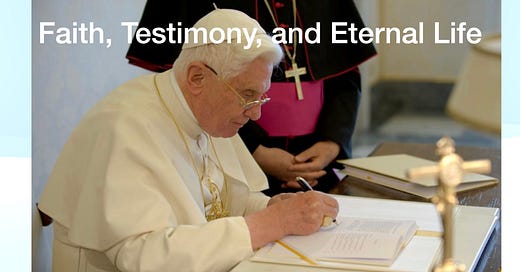In today's passage from the first letter of John (1 John 5:5-13), I would like to highlight three points. The first one is the victory through faith in Jesus Christ. John says that our faith in Christ overcomes the world. John's understanding of the world differs from ours. It has nothing to do with nature but with human
society marked by "the desires of the flesh and the desires of the eyes and pride of life" (1 John 2:16). As a remedy to these three challenges that we face in life, the Spirit of the Lord empowers us to live a life of holiness, simplicity, and obedience. Thus, when John says that the one who believes that Jesus is the Son of God overcomes the world, he refers to those who live out their faith in love.
The second point is about testimony. John speaks about three witnesses: water, blood, and the Spirit (1 John 5:7-8). The only time we see water and blood together is in the Passion Story. Jesus' side was pierced with a lance and "at once there came
out blood and water" (John 19:34). Since ancient times, this event was understood as the "birth" of the Church and her sacramental life. Then, in Luke's account of the Lord's Passion, Jesus' last sentence was: "Father, into your hands I commit my Spirit!" (Luke 23:46). This Spirit has been poured out on the Church on the day of Pentecost. Pope Leo the Great (440-461 AD) saw in these three witnesses "the Spirit of sanctification and the blood of redemption and the water of baptism".
Finally, the last point that John makes in today's fragment is the assurance of eternal life. John states that "eternal life" does not begin after our death. He says "that God gave us eternal life" (1 John 5:11). It is already given to all those who believe in Christ: "This life is in his Son" (1 John 5:11). Thus, eternal life springs from our relationship with the living God. Here, all our legends about the human search for the elixir of immortality ends. By uniting ourselves with Christ's death and His resurrection through the sacrament of baptism, by nourishing ourselves with the Living Bread, and by becoming the living temple of the Holy Spirit, we "have eternal life" (1 John 5:13).
I would like to end this reflection with a beautiful quote about life from Pope Benedict. In his encyclical letter "On Christian Hope - Spe Salvi", the late Pope wrote: "Life in its true sense is not something we have exclusively in or from ourselves: it is a relationship. And life in its totality is a relationship with him who is the source of life. If we are in relation with him who does not die, who is Life itself and Love itself, then we are in life. Then we “live” (Spe Salvi 27).




